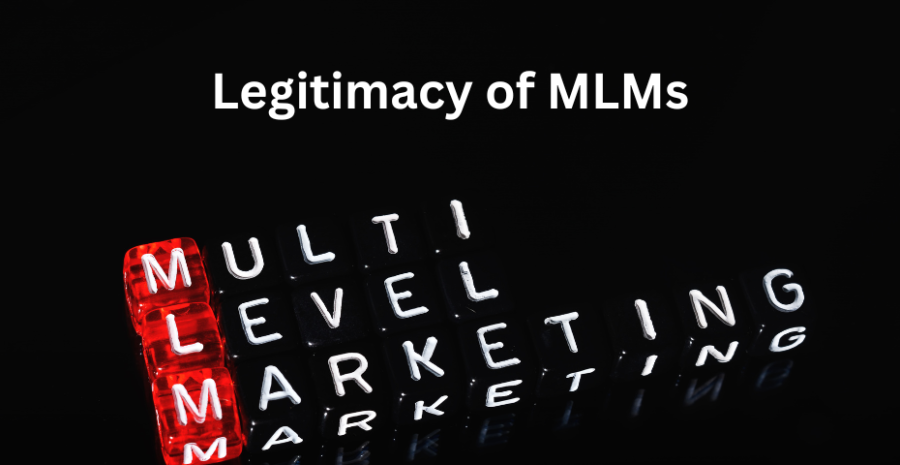
Is MLM a Scam? Unveiling the Truth Behind Multi-Level Marketing

Multi-Level Marketing (MLM) is a controversial business model. Whether it is considered a scam or a legitimate opportunity can depend on various factors, including the specific company, its business practices, and how it is managed. Here are some key points to consider:
Here are some key points to consider:

1. Legal MLMs:
These companies sell real products or services and make money primarily through sales to customers, not just recruiting new members. Examples include Amway, Avon, and Herbalife.
Legal MLMs operate within the framework of established laws and regulations, focusing primarily on selling genuine products or services rather than just recruiting new members. These companies typically provide clear and transparent compensation plans, emphasizing earnings from actual sales rather than recruitment commissions.
They often offer training and support to their distributors, helping them develop sales skills and build sustainable businesses. Established legal MLMs usually have a long track record, reputable leadership, and a wide range of satisfied customers.
Regulatory bodies, such as the Federal Trade Commission (FTC) in the United States, monitor these businesses to ensure compliance with legal standards. By focusing on product quality and customer satisfaction, legal MLMs distinguish themselves from pyramid schemes and other fraudulent operations.
2. Illegal Pyramid Schemes:
These focus more on recruitment than actual product sales. New recruits pay upfront fees, which go to earlier participants, and earnings are based more on bringing in new members rather than selling products. These are illegal in many countries.
Illegal pyramid schemes prioritize recruitment over product sales, making them unsustainable and exploitative. These schemes typically require new recruits to pay upfront fees, which are used to compensate earlier participants rather than for legitimate business expenses.
Earnings are primarily derived from continuously bringing in new members, creating a cycle that eventually collapses when recruitment slows. Often, the products, if any are sold, are overpriced and have little market value, serving only as a facade for the recruitment-focused model.
Participants in pyramid schemes often face significant financial losses and legal consequences. Regulatory agencies globally, including the Federal Trade Commission (FTC) in the United States, actively work to identify and shut down these illegal operations to protect consumers from fraud.

1. Product Value:
Is the product something that people outside the MLM would buy at the listed price? High-quality products that are fairly priced and meet market needs are a good sign.
Product value is a critical factor in determining the legitimacy of an MLM. High-quality products that meet genuine consumer needs and are competitively priced indicate a focus on real sales rather than recruitment. A valuable product attracts repeat customers and can sustain an MLM's business model without relying heavily on recruiting new members.
Additionally, products that are unique or offer clear benefits over competitors' offerings strengthen an MLM's market position. Transparency about product ingredients, sourcing, and benefits further boosts consumer trust. Ultimately, an MLM's emphasis on delivering genuine value through its products is a key sign of its legitimacy and long-term viability.
2. Income Claims:
Be cautious of exaggerated income claims. Many people in MLMs do not make substantial income, and some may lose money.
Income claims in MLMs can be highly misleading, often painting an overly optimistic picture of potential earnings. Many MLMs showcase success stories of top earners, which can create unrealistic expectations for new recruits. In reality, a significant portion of participants earn little to no profit, with many even losing money due to upfront costs and ongoing expenses.
Legitimate MLMs provide transparent income disclosures, detailing the average earnings and success rates of their distributors. Prospective members should critically evaluate these claims and consider the financial risks involved. It’s essential to recognize that achieving substantial income in an MLM typically requires significant time, effort, and sales skills, which may not be feasible for everyone.
3. Recruitment Focus:
If the primary emphasis is on recruiting new members rather than selling products, it might be a red flag.
A heavy recruitment focus is often a red flag in MLMs, signaling potential pyramid scheme characteristics. When the primary emphasis is on recruiting new members rather than selling products, the business model becomes unsustainable and relies on a continuous influx of new participants.
This can lead to a cycle where early members benefit at the expense of those who join later, who may find it increasingly difficult to recruit new members. Ethical MLMs prioritize product sales and customer satisfaction over recruitment, ensuring that earnings are primarily derived from legitimate sales activities.
Prospective members should be wary of MLMs that offer significant bonuses or incentives for recruitment, as this can indicate a flawed business structure. Evaluating the balance between product sales and recruitment focus is crucial in determining the legitimacy and long-term viability of an MLM.
4. Transparency:
Legitimate companies are transparent about their compensation plans, average earnings, and business practices.
Transparency is a cornerstone of trust in any MLM, helping distinguish legitimate companies from potential scams. A transparent MLM provides clear, detailed information about its compensation plan, average earnings, and the realistic efforts required to achieve success.
Such companies openly share their business practices, product details, and financial disclosures, enabling prospective members to make informed decisions. Transparent MLMs also welcome scrutiny from regulatory bodies and independent auditors, further proving their commitment to ethical operations.
This openness fosters trust among members and customers, contributing to the company’s long-term stability. Ultimately, transparency not only builds credibility but also helps protect consumers from fraud and unrealistic expectations.

1. Research:
Look up reviews, complaints, and legal actions involving the company. Check with consumer protection agencies and the Better Business Bureau.
Conducting thorough research is essential before joining an MLM to ensure its legitimacy and avoid potential scams. Start by examining the company’s history, including its founding, leadership, and any past legal issues. Look for independent reviews and testimonials from current and former members to gauge their experiences and earnings.
Check resources like the Better Business Bureau and consumer protection agencies for complaints or warnings about the MLM. Investigate the quality and marketability of the products or services offered, ensuring they have genuine value outside of the MLM structure.
Analyzing the compensation plan for clarity and fairness is also crucial, as complex or vague plans can be a red flag. Ultimately, comprehensive research helps you make an informed decision and protects you from financial loss and disappointment.
2. Company History:
Established companies with a long track record are generally more reliable than new or less well-known entities.
The company history of an MLM can provide significant insights into its credibility and stability. Established MLMs with a long track record typically have proven business practices, which can be a reassuring sign for potential recruits.
Researching the background of the founders and leadership team is also important, as experienced and reputable leaders are more likely to steer the company ethically. Historical data on the company’s growth, product evolution, and market presence can indicate its ability to adapt and thrive in changing economic conditions.
It’s also valuable to look into any past legal challenges or controversies the company has faced, as these can highlight potential red flags. Overall, a thorough understanding of an MLM’s history can help you assess its reliability and long-term prospects.
3. Independent Reviews:
Seek opinions from independent sources, not just those involved in the MLM.
Independent reviews are a crucial resource for evaluating the legitimacy of an MLM. These reviews, coming from unbiased sources, provide an objective perspective on the company’s operations, compensation plan, and product quality.
Seeking out reviews from reputable websites, industry experts, and former or current members can offer a more balanced view compared to company-provided testimonials. Independent reviews can reveal common issues, such as high turnover rates or hidden costs, that might not be immediately apparent.
Additionally, they can highlight positive aspects and genuine success stories, helping to form a well-rounded opinion. By consulting a range of independent reviews, you can make a more informed decision and avoid potential pitfalls associated with MLMs.

1. High Turnover:
Many participants leave within a year due to lack of earnings.
High turnover is a significant warning sign in MLMs, often indicative of underlying issues within the business model. When a large percentage of participants leave the MLM shortly after joining, it can suggest dissatisfaction with earnings, product quality, or overall business practices.
High turnover rates can be symptomatic of unrealistic income expectations, inadequate support, or a lack of sustainable income opportunities. Frequent departures can destabilize the MLM, impacting the remaining members and potentially affecting customer satisfaction.
Understanding turnover rates and the reasons behind them can provide valuable insights into the MLM’s operational health and its potential for long-term success. Addressing high turnover effectively requires examining the root causes and evaluating whether the MLM can offer a viable and supportive business environment.
2. Social Pressure:
Recruiting friends and family can strain personal relationships.
Social pressure is a common challenge in MLMs, where recruits are often encouraged or even coerced to involve their friends and family. This can strain personal relationships as individuals may feel obligated to join or purchase products to support loved ones.
The constant push to recruit new members or make sales can create uncomfortable situations, leading to feelings of guilt or discomfort. Such pressure can also exacerbate financial losses for recruits who struggle to meet sales targets or recruitment quotas.
Ethical MLMs strive to minimize social pressure by focusing on genuine sales and providing supportive, transparent guidance. Recognizing and addressing the impact of social pressure is crucial for maintaining healthy personal relationships and ensuring a positive, respectful business environment.
3. Upfront Costs:
Initial costs for joining and maintaining membership can be high.
Upfront costs in MLMs can be a major concern, often representing a significant financial commitment for new recruits. These initial expenses may include joining fees, purchasing starter kits, or investing in inventory, which can place a substantial burden on individuals.
High upfront costs can be a red flag, especially if they are required before any potential earnings are realized. It’s important to assess whether these costs are justified by the value of the products or services and whether they contribute to a legitimate business setup.
Transparent MLMs will clearly outline these costs and provide a realistic assessment of what recruits can expect to earn. Evaluating the necessity and fairness of these upfront costs can help avoid financial strain and ensure that investments are sound and reasonable.
While not all MLMs are scams, the business model has inherent risks and challenges. Thorough research and critical evaluation are essential before getting involved. If an MLM focuses more on product sales than recruitment, it is more likely to be a legitimate business.
The question of whether MLMs are scams is not a straightforward one and depends largely on the specific company and its business practices. Legal MLMs, which focus on product sales and offer transparent business operations, can provide genuine opportunities for those willing to invest time and effort.
However, the prevalence of illegal pyramid schemes, which prioritize recruitment over product value, underscores the need for caution. Evaluating factors such as product quality, income claims, recruitment focus, and company history is essential for making an informed decision.
Conducting thorough research and seeking independent reviews can provide valuable insights into the legitimacy of an MLM. Awareness of potential pitfalls, such as high turnover, social pressure, and upfront costs, is crucial for protecting oneself from financial losses and disappointment. Ultimately, discerning the legitimacy of an MLM requires careful analysis and a critical approach to ensure that the opportunity aligns with your financial goals and values.
.jpg)
About: Andries vanTonder (65)
Over 45 years selfemployed
He is a Serial Entrepreneur, an Enthusiastic supporter of Blockchain Technology and a Cryptocurrency Investor
Find me at my Markethive Profile Page | My Twitter Account | My Instagram Acount | and my Facebook Profile.
